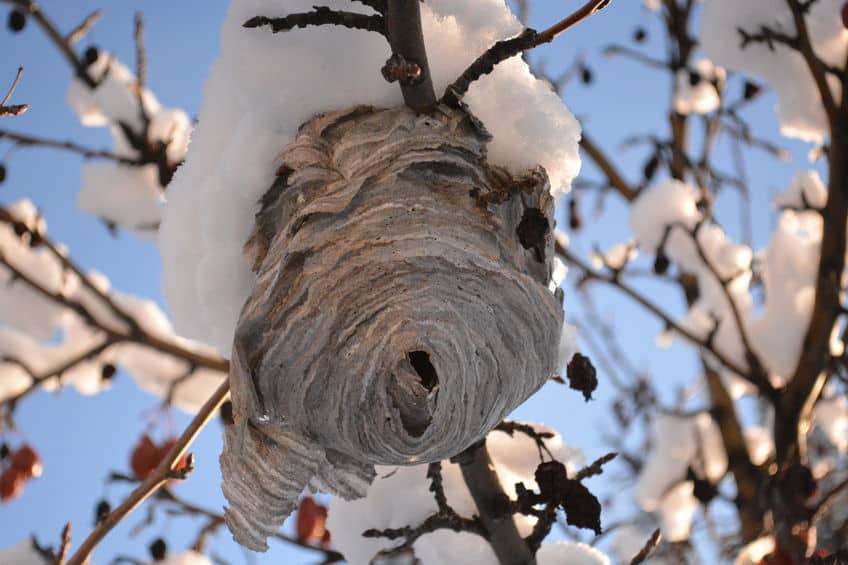You may not have seen any wasps all winter long and wonder just where they go.
The vast majority of social wasps do not survive the winter. Only the queen survives who will then go into hibernation. The last male wasps will inseminate the queen before dying themselves. Come spring the queen will come out of hibernation and lay her eggs in a new nest. In areas with mild winters wasp colonies may survive all year round.
Let’s take a closer look at how the cold impacts wasps.
How does the cold affect wasps?
Temperatures below 50°F (10°C) can start to have a serious impact on wasps’ ability to function as their nervous system begins to shut down. The reduction in food sources also makes it difficult for wasps. The absence of nectar from flowers will push wasps into ever-increasing contact with humans as they seek out sugar sources. See this article on wasps attraction to food

The queen wasp will typically be the only wasp to survive this cold weather. The queen is sometimes a larger size than worker wasps which is the case with yellow-jacket wasps. For other wasp species including common European wasps, the queen is indistinguishable from the other wasps. Read more about queen wasps.
Where do queen wasps hibernate?
Queen wasps will hibernate in areas that protect them from freezing temperatures. This includes cracks in building structures, within trees, and in woodpiles. Houses obviously appeal due to their insolation and warmth.
If a queen has been attracted to hibernate within a house this could potentially be problematic if she later decides to build her nest within the same vicinity.
During hibernation, the queen tucks her wings up around her body for protection.
Do wasp nests survive winter?
Wasps do not typically reuse the nests from the previous season. As above-ground wasp nests are constructed from wood pulp they mostly do not survive the harsh winter conditions.
Queens will for the most part seek to rebuild a nest in a similar area to the previous nest site due to the familiarity of the area. It is known that wasps avoid nesting near the presence of another nest to avoid conflict over resources.
What happens if the queen dies during winter?
As the queen is the only member of the colony to survive winter, the reestablishment of a new colony in the spring is entirely up to her. If the queen does not survive then a colony that may have had up to 5000 wasps or more can not get started. For this reason, queens are often targeted in strategies to reduce wasp populations.
What happens to wasps in areas with mild winter?
In areas where the temperatures do not get significantly cold then wasps colonies can survive all year round. Invasive German wasp colonies in New Zealand, for example, have been observed to be active all winter due to mild temperatures and availability of prey.
This results in truly enormous colony sizes. The beech forests at the top of Newzealand’s south island have the highest wasp population densities in the world, with an estimated 10,000 wasps per hectare. (source)
